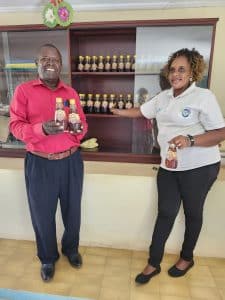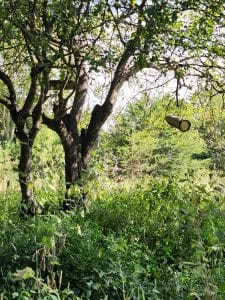“Harvesting beehives used to be men’s work,” said Josephine Mutambuki, Secretary of the Kibewzi Honey Co-operative. “But now, even the women can harvest.”
The Kibewzi Honey Co-operative, originally established in 1987 as a community-based organization, officially became a co-operative in 2018. Today, it boasts 350 members, all women, with 159 currently active. Membership often passes from one generation to the next, with older women entrusting their co-operative roles to younger women in their families.
The women of the Kibewzi Honey Co-operative walk through the forest in Makueni County to access both traditional and contemporary beehives, harvesting honey and wax. The co-operative purchases the products, paying the women based on the kilograms they collect – earnings that many use to cover essential expenses like school fees.

Julius and Josephine holding jars of honey.
The co-operative then processes, packages and sells the honey and wax. The revenue generated supports the co-operative’s operations, including processing, electricity, obtaining health certificates, and maintaining the necessary county licenses.
“The women are excited about the business,” Josephine said, “both for the financial benefits it brings to their households and for its positive impact on the environment.”
This enthusiasm was recently reinforced and reinvigorated by a Gender and Disability Sensitivity Workshop, organized by CDF Canada’s VOICE for Women and Girls Program. The workshop aimed to raise awareness and promote understanding of the intersectionality between gender and disability, equipping co-operative members with the knowledge and skills necessary to foster inclusive environments and ensure equitable treatment for all, regardless of gender identity or disability.
“The members learned a lot about gender,” Josephine reflects. Julius Nyerere Wambua, a technical advisor to the Kibewzi Honey Co-operative, concurs, adding that more such workshops are needed to further empower the women.
Among the additional training that would be valuable, Josephine notes, are workshops focused on enhancing the quality of honey and increasing the number of beehives. With increased quality and increased production, the Kibewzi Honey Co-operative could potentially expand its reach to the export market. However, Julios points out, “we cannot yet produce at the rate needed to target that market.”

A traditional beehive hangs from a tree.
The co-operative also faces financial challenges that hinder its growth. While it received some government funding when it transitioned to a co-operative, the funds are insufficient for the expansion needed to reach larger markets. Membership cost 1,000 KSH and shares are 5,000 KSH, but since women can pay for shares gradually, the co-operative does not receive an immediate influx of capital.
“The problem is money from any source. Without capital, we cannot buy more honey or expand our operations,” said Julius.
Currently, the honey and wax from the co-operative are sold locally, reaching nearby towns, counties, large families, supermarkets, and hotels.
“We have a business plan and we want to increase our number of hives and bring that plan to life,” said Julius.
Over the years, the women have adapted their methods for collecting honey. No longer relying on wood fires, they now use smokers, a safer and more sustainable technique.
“The whole system used to use firewood to produce smoke. But nowadays we don’t use firewood,” Julius notes.
Supported by the government, the women have also initiated reforestation efforts, planting trees in the areas where their beehives are located. They are expected to plant 15,000 trees annually, contributing to environmental conservation in tandem with their honey production.
Through the support of the VOICE for Women and Girls Program, the Kibewzi Honey Co-operative has not only empowered its members to break traditional gender roles but has also positioned them as leaders in sustainable agriculture. The program’s emphasis on gender equality and inclusivity has revitalized the co-operative, allowing these women to take charge of their economic futures while fostering a healthier environment for their communities. The impact of VOICE is clear: it’s not just about changing lives— it’s about transforming communities for the better.